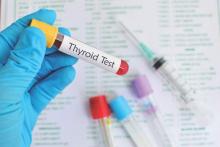The benefits of treating subclinical hypothyroidism with low-dose levothyroxine may outweigh the harms of delaying treatment until the condition has become symptomatic, requiring higher doses, according to one of the authors of a “Beyond the Guidelines” assessment of this controversy.
Last year, the U.S. Preventive Services Task Force issued guidelines and updated its 2004 recommendations, which essentially stated that there is no evidence to support treating subclinical hypothyroidism. In their own guidelines, the American Association of Clinical Endocrinologists and American Thyroid Association have instead advocated aggressive case-finding and recommend screening individuals who may be a high risk. These societies also argue that subclinical hypothyroidism can have an adverse effect on cardiovascular outcomes and therefore it merits case-findings.
In the June 6, 2016 issue of the Annals of Internal Medicine (doi: 10.7326/M16-0857), experts from Beth Israel Deaconess Medical Center in Boston offered differing perspectives on the issue, as to whether or not subclinical hypothyroidism should be treated.
They gave their viewpoints in the context of a case study:
Mrs. C is a 60-year-old woman who has experienced mild symptoms such as fatigue and constipation for about 10 years, and has a family history of “thyroid problems.” In 2012, her TSH level was slightly elevated (5.8 uIU/L), and in 2013, she reported fatigue, although her TSH level was similar (5.9 uIU/L) to the year before.
Her free thyroxine (T4) was normal (0.93 ng/dL), and given the stability of her TSH level, treatment was not initiated. Recently, she reported weight gain, intermittent constipation, and persistent fatigue. Currently she is being treated for hyperlipidemia with atorvastatin 10 mg daily as well as for cervical radiculitis. Two of her three sisters receive thyroid medication, and recently, her blood pressure was 136/79 mm Hg with a heart rate of 77 beats per minute. Her weight had increased by 9 pounds, to 156 pounds (body mass index, 29.6 kg/m2). Her thyroid examination was normal, and her TSH measurement was 6.5 uIU/ML and free T4 was 1 ng/dL.
Should she begin thyroid replacement therapy?
Dr. Pamela Hartzband noted that there is an “evidence base suggesting that patients like Ms. C may benefit with respect to both morbidity and mortality,” given her family history and elevated cholesterol levels. TSH is a sensitive indicator of primary hypothyroidism, and given that the patient’s levels have gradually increased, this is significant and suggests early thyroid failure. That said, in “reviewing the evidence for benefit of treatment, there are not only conflicting data but also conflicting interpretation[s] of the same data by different experts,” according to Dr. Hartzband.
However, subclinical hypothyroidism has been associated with a greater risk for both cardiovascular morbidity and mortality in some but not all prospective population-based studies.
Symptom relief is the primary goal for patients, and Mrs. C has described symptoms that are suggestive of hypothyroidism including fatigue, constipation, scalp hair loss, and weight gain and elevated TSH. There is a “paucity of evidence” demonstrating improvement with treatment of subclinical hypothyroidism. And while harms associated with treatment can also be a concern, there is remarkably limited evidence for harms related to the treatment of subclinical hypothyroidism, noted Dr. Hartzband of the division of endocrinology and metabolism and medical director of the Thyroid Biopsy Clinic at Beth Israel Deaconess Medical Center, Boston.
There is, however, speculation that patients might develop hyperthyroidism from being given excessive doses of levothyroxine, but this can be avoided by initiating treatment of subclinical hypothyroidism with low-dose levothyroxine (25-50 mcg).
Overall, when weighing the benefits and harms of treatment in this case, Dr. Hartzband would consider offering Ms. C a trial of levothyroxine. The reasoning is that based on family history, she is at increased risk for thyroid disease and was appropriately tested by measuring TSH. In addition, levothyroxine could lower her cholesterol levels and risk for heart disease, and she might be able to reduce or even discontinue her statin therapy.
“I believe that for Ms. C the potential for benefit outweighs potential risk,” wrote Dr. Hartzband. “If she does not feel better and if cholesterol is not improved, then levothyroxine could be stopped until her TSH rises further.”
Dr. Carol K. Bates of the division of general medicine and primary care at Beth Israel Deaconess Medical Center, Boston, leaned more toward holding back on treatment. For one thing, since there is a diurnal variation in TSH, the patient’s TSH values might have been normal if measured in the afternoon instead of the morning.
As far as the risk of heart disease, where much of the treatment debate is focused, she pointed out that while there is an association between congestive heart failure, coronary artery disease, and subclinical hypothyroidism, Mrs. C only has a mildly increased TSH.


